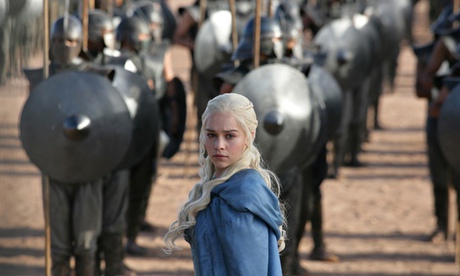
What are we to make of the news that Westeros, George RR Martin's magical, mythical fantasy land of machiavellian devilry, heaving cleavages and icy forces of darkness, might be coming to the big screen? The first thought to enter the mind should really be: "Why not?"
Part of the reason Game of Thrones is such a success is that it cleaves closer to the world of cinema than traditional TV – or at least, telly as it used to be. HBO's blueprint – gorgeous location shoots, spine-tingling cinematography, first-rate casting – is straight out of Hollywood's big budget songbook.
Yet Martin, who created A Song of Ice and Fire, the series of novels on which the TV show is based, believes the finale to the series might work better in multiplexes. It's not hard to see why: Game of Thrones may be one of the most expensive shows of all time, but there is a vast difference between the $6m (£3.65m) cost of an average episode and the $100m budget that a big screen transfer might demand. While producers did a great job with chapters such as season two's Blackwater, in which the epic Battle of Blackwater was fought at King's Landing, Martin is probably thinking way, way ahead to the point where Emilia Clarke's Daenerys Targaryen (presumably) makes her final assault on Westeros in an effort to reclaim the crown her family lost many years before. "Those dragons get real big, you know," he told reporters at the premiere of season four in New York.
Game of Thrones acolytes will be well aware that at least one more book is due to arrive before we even get to see the tome in which the last battle of Westeros is likely to be depicted. And given that it took Martin five years to write 2011's A Dance With Dragons, we may be in for a long wait.
When it does arrive, and assuming the author hasn't thrown one of his trademark curveballs in the meantime, said dragonly march to ultimate victory deserves to have everything thrown at it. One can already imagine huge, fully-grown versions of Drogon, Rhaegal and Viserion swooping down on the battlements of King's Landing, destroying entire armies with their flames and perhaps eating Cersei Lannister for dinner.
The Hollywood Reporter, which first relayed Martin's comments, seemed to infer that Hollywood studio Warner Bros might make a rather good job of a Game of Thrones movie. But producers would do well to avoid switching their regular team for film-makers used to larger budgets. Game of Thrones must maintain its passion for intrigue and barbed dialogue as it moves into louder, larger and more spectacular territory, or its filmic denouement will stand out like a Duplo brick that has somehow found its way into a box of Lego.
Fans will want to see a movie that feels like an extended, expensive take on the TV show, with plenty of focus on the characters that the series has led us to love or hate with such gleeful passion. Without these essentials, the film version could present dragons the size of small nations and still represent a major disappointment.
With luck, it might just complete a job that Game of Thrones producers David Benioff and DB Weiss have been quietly working on for years, namely editing out Martin's more offbeat, non-linear flights of fancy in favour of a simpler, more satisfying narrative path. There is nothing like having to wrap everything up in the space of two hours (or perhaps four if the adaptation goes the Lord of the Rings route) to focus the mind and ensure no loose ends are left dangling.
Martin also held out the possibility of films based on his Tales of Dunk and Egg trilogy of novellas. Set 60 years prior to the events of A Song of Ice and Fire, these books are hardly less violent or bloodthirsty than the main saga. But, written entirely from the viewpoint of title character Ser Duncan the Tall, they are less complex and would make fine cinematic fantasy material.
The Dunk and Egg series is in many ways Martin's Hobbit. It is a lighter, less vicious take on the world seen in A Song of Ice and Fire, just as JRR Tolkien's earlier tome is a warm and whimsical look at the terrifying world the English author would later detail in Lord of the Rings. One imagines that a certain Peter Jackson will be hunting around for new material once his current Hobbit trilogy has finally completed its run in cinemas. He could do worse than giving Martin a call.

